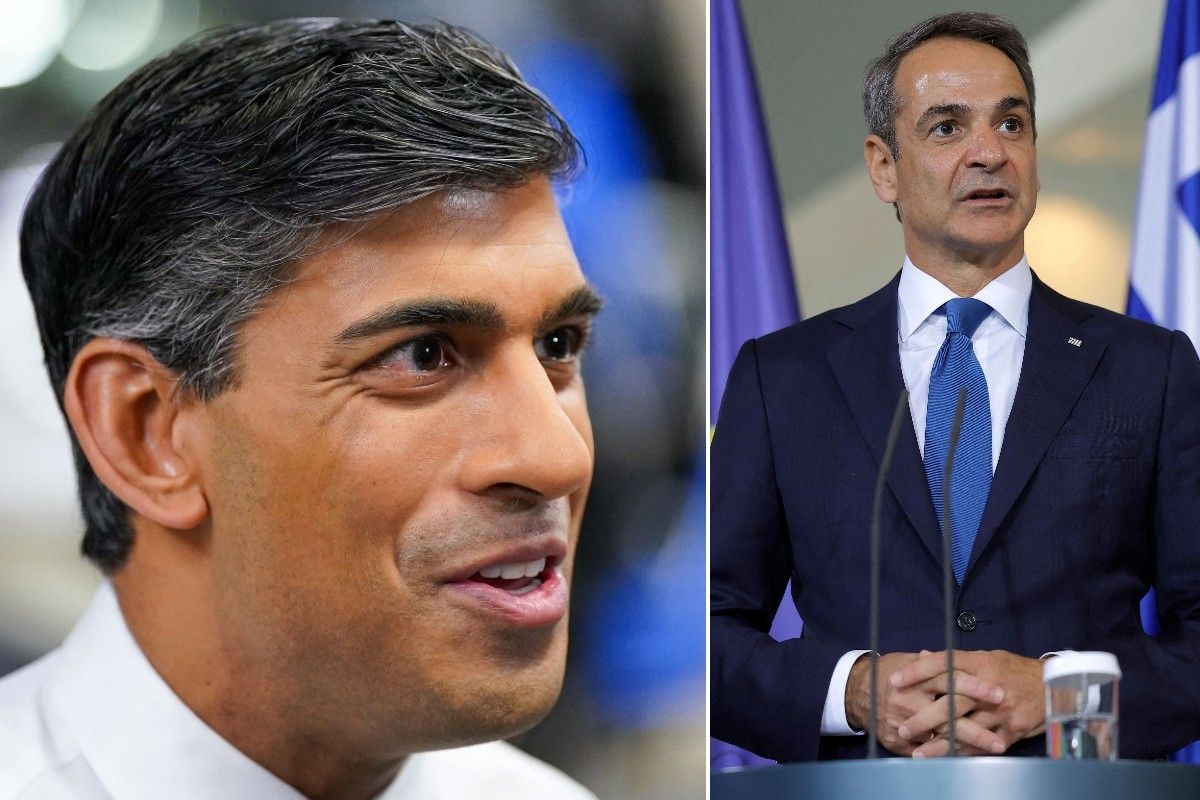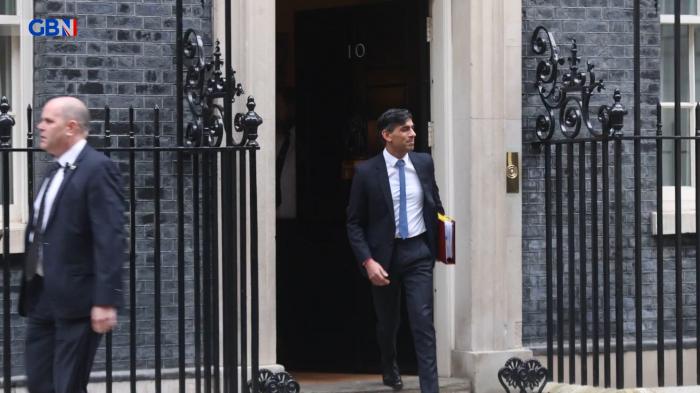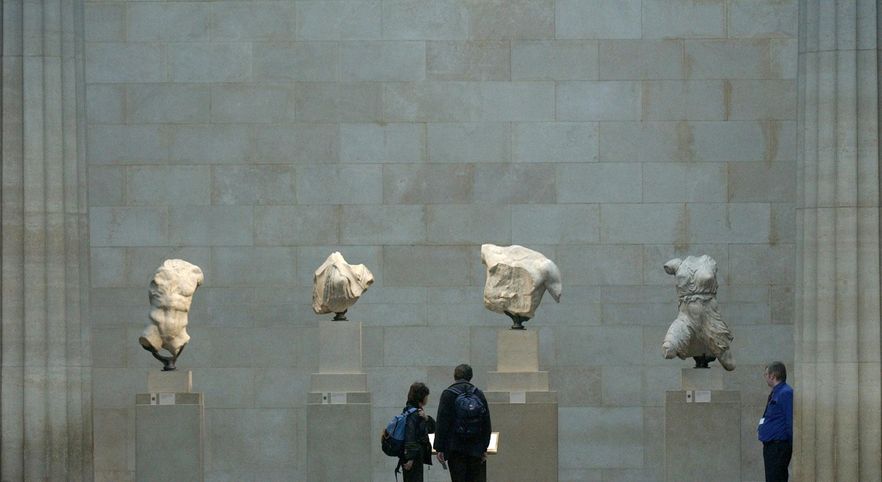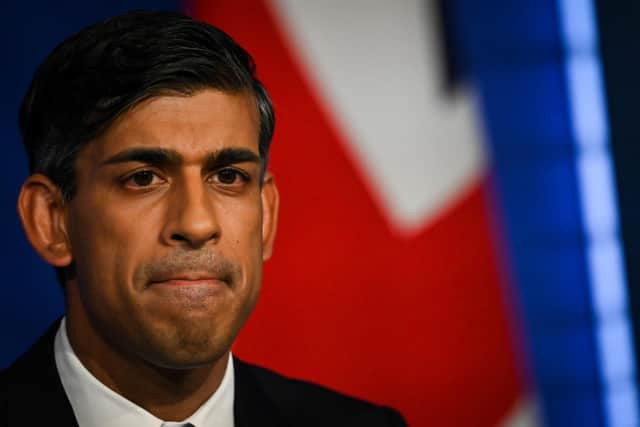Athens MUST admit that UK owns Elgin Marbles before any loan deal, Sunak tells Greeks

By Christopher Hope
Published: 01/12/2023 -
George Osborne claimed Sunak had had a ‘hissy fit’ over the marbles
Greece needs to admit that the UK owns the Elgin marbles before any loan deal can be agreed, Rishi Sunak has said, as he risks reopening the row with Athens over the ancient treasures.
A diplomatic row broke out this week when Sunak cancelled a meeting with the Greek prime minister after he raised the issue of the marbles in a television minister, sparking a war of words between the two countries.
That led to George Osborne, the former Tory Chancellor and now chairman of the British Museum who has been trying to negotiate a loan deal for the marbles with Athens, saying that Sunak had had a "hissy fit" over the marbles.
However, speaking to reporters en route to the COP28 climate summit in the United Arab Emirates, Sunak said: "When it comes to them our position is very clear as a matter of law the marbles can’t be returned and we’ve been unequivocal about that.
Rishi cancels meeting with Greek PM amid Elgin Marbles row

"And I think the British Museum’s website itself says that in order for the loans to happen the recipient needs to acknowledge the lawful ownership of the country that’s lending the things.
"The Greeks have not suggested that they are in any way shape or form willing to do that.
"Our view and our position on that is crystal clear: the marbles were acquired legally at the time."
The Prime Minister’s comments come after George Osborne today said he would actively pursue a deal with the Greek PM, Kyriakos Mitsotakis, to allow the Elgin Marbles to be displayed in Athens.
The Greek Prime Minister wants the Elgin Marbles back

George Osborne set to DEFY Rishi in Elgin Marbles row as he pursues deal with Greek PM
Osborne told The Times the negotiations would continue "whether or not Rishi Sunak meets the Greek Prime Minister” after a meeting between the pair was cancelled just hours before it was due to take place.
Mitsotakis snubbed a proposed alternative meeting with Deputy PM Oliver Dowden and said he was "deeply disappointed" by Sunak’s abrupt cancellation.
However, Keir Starmer successfully met with Mitsotakis on Monday, with Osborne claiming an exchange could happen under a Labour Government.
A spokesperson for Starmer said the Labour leader would "not spend any time legislating on this matter" if he became PM but that he "wouldn’t stand in the way" of a deal between the British Museum and Athens.
A diplomatic row broke out this week when Sunak cancelled a meeting with the Greek prime minister after he raised the issue of the marbles in a television minister
Speaking on his podcast Political Currency with co-host Ed Balls, Osborne said his deal with Greece would allow the sculptures to spend time in both London and Athens with the intention of allowing "Greek treasures coming our way in return".
"And that is, I think, something worth exploring," Osborne said, "and we can go on doing it whether or not Rishi Sunak meets the Greek prime minister or not.
"In fact, if anything, things have been rather clarified by this week. We obviously know we’re not going to get any particular support from the Conservative government.
"But in fact the Labour leader, Keir Starmer, also said that while he supported the British Museum’s efforts, he wasn’t planning to change the law.
"And if you don’t change the law, then there is no prospect anytime soon of them just being restituted to Greece, returned with nothing, simply handed back, which anyway wouldn’t be a decision for the museum.
"And so to my mind, as chair of the British Museum, it is all the more reason to press on with our efforts to try and reach an agreement with the Greeks."
However, speaking to reporters en route to the COP28 climate summit in the United Arab Emirates, Sunak said: "When it comes to them our position is very clear as a matter of law the marbles can’t be returned and we’ve been unequivocal about that.

"And I think the British Museum’s website itself says that in order for the loans to happen the recipient needs to acknowledge the lawful ownership of the country that’s lending the things.
"The Greeks have not suggested that they are in any way shape or form willing to do that.
"Our view and our position on that is crystal clear: the marbles were acquired legally at the time."
The Prime Minister’s comments come after George Osborne today said he would actively pursue a deal with the Greek PM, Kyriakos Mitsotakis, to allow the Elgin Marbles to be displayed in Athens.

The Greek Prime Minister wants the Elgin Marbles back

George Osborne set to DEFY Rishi in Elgin Marbles row as he pursues deal with Greek PM
Osborne told The Times the negotiations would continue "whether or not Rishi Sunak meets the Greek Prime Minister” after a meeting between the pair was cancelled just hours before it was due to take place.
Mitsotakis snubbed a proposed alternative meeting with Deputy PM Oliver Dowden and said he was "deeply disappointed" by Sunak’s abrupt cancellation.
However, Keir Starmer successfully met with Mitsotakis on Monday, with Osborne claiming an exchange could happen under a Labour Government.
A spokesperson for Starmer said the Labour leader would "not spend any time legislating on this matter" if he became PM but that he "wouldn’t stand in the way" of a deal between the British Museum and Athens.
A diplomatic row broke out this week when Sunak cancelled a meeting with the Greek prime minister after he raised the issue of the marbles in a television minister
Speaking on his podcast Political Currency with co-host Ed Balls, Osborne said his deal with Greece would allow the sculptures to spend time in both London and Athens with the intention of allowing "Greek treasures coming our way in return".
"And that is, I think, something worth exploring," Osborne said, "and we can go on doing it whether or not Rishi Sunak meets the Greek prime minister or not.
"In fact, if anything, things have been rather clarified by this week. We obviously know we’re not going to get any particular support from the Conservative government.
"But in fact the Labour leader, Keir Starmer, also said that while he supported the British Museum’s efforts, he wasn’t planning to change the law.
"And if you don’t change the law, then there is no prospect anytime soon of them just being restituted to Greece, returned with nothing, simply handed back, which anyway wouldn’t be a decision for the museum.
"And so to my mind, as chair of the British Museum, it is all the more reason to press on with our efforts to try and reach an agreement with the Greeks."
Rishi Sunak is making it increasingly obvious that he is a terrible Prime Minister – Joyce McMillan
In the litany of terrible Prime Ministers Britain has endured since 2010, the best that can be said for Rishi Sunak is that he is probably not the worst. That honour is likely to be held, for some decades at least, by the inimitable Liz Truss, whose 46-day premiership last autumn was notoriously met by the new monarch, King Charles – when she turned up for a weekly audience – with the deathless greeting: “Back again? Dear oh dear.”
Yet if Sunak is performing better than Truss, it is still sometimes difficult to resist the feeling that he is doing his best to equal her in both incompetence and unpopularity. The latest debacle to engulf him – and one entirely of his own making – is the affair of what his Education Secretary Gillian Keegan calls the El-jin Marbles, otherwise known as the Parthenon sculptures, or part of them.
These massive sculptures were removed from the Acropolis in Athens between 1801 and 1812, under the supervision of Thomas Bruce, 7th Earl of Elgin, who claimed – somewhat debatably – to have official permission for their removal from the Ottoman authorities. They were transported to Britain, and eventually sold by Lord Elgin to the British Museum; but in 1983, the Greek government made a formal request for their return, which has been strenuously debated ever since.
The problem, though, is that the fate of artefacts such as the Parthenon marbles has lately become a hot topic among those on the right who enjoy whipping up culture wars, not least around nostalgia for imperial times, when Britain had the power and wealth to raid or buy up the world’s riches at will. That these conditions no longer prevail in the 21st century is obvious; but it is also a source of grief to the empire nostalgists who currently exert a disproportionate influence over the Tory party, not least through the shrieking “patriotic” press.
So although Sunak has shown little sign of interest in culture and the arts in his public life, and is defended by an Education Secretary who knows so little of these sculptures that she cannot even pronounce their traditional British name, we are now treated to the spectacle of a politically inept Prime Minister trying to win “anti-woke” brownie points by cancelling a planned meeting with the Greek Prime Minister, and provoking a severe and damaging diplomatic row with a major European ally – a row over the fact that the Greek PM, in a pre-summit interview, reiterated the well-worn argument for the return of the sculptures which has been Greek government policy for over 40 years.
If the Parthenon debacle offers a graphic insight into Sunak’s capacity for poor judgment, though, it is only the tip of a very large iceberg of woes now assailing him. The UK Covid Inquiry is not going well for the Prime Minister, whose Eat Out To Help Out scheme, implemented in the summer of 2020 when he was Chancellor of the Exchequer, has become something of a byword for the Johnson government’s failure, in the first year of the pandemic, to strike the right balance between Covid reduction measures and the promotion of economic activity.

Contrast with David Cameron’s authority
This week’s sky-high annual net immigration figure, running at almost 750,000, was also exceptionally bad news for a Prime Minister who has, perhaps unwisely, never hesitated to collude with the idea that “stopping the boats”, and achieving general reductions in migration, should be an overwhelming priority for the UK Government; too quick to reappoint Suella Braverman to government, he was also too slow to sack her for her irresponsible conduct in office.
If Sunak hoped, what is more, that his initial strong pro-Israel stance in the current Gaza crisis would help shore up electoral support at home, then it seems he will be disappointed. His new Foreign Secretary David Cameron – an authoritative figure compared with Sunak – is already rowing back rapidly towards a position that recognises some of the obvious demands of international law; and meanwhile in Scotland, the latest independence poll, published by Ipsos Mori, hints that the stance on Gaza shared by government and opposition at Westminster may have created an opportunity for the SNP to rebuild support, just as Alex Salmond’s opposition to the Iraq War did 20 years ago.
And finally, there is the grim state of the British economy, now haunted by levels of poverty and financial stress not seen in this country for decades. Sunak’s babbling support for Jeremy Hunt’s abysmal autumn statement, delivered last week, marks him out for posterity as just another Tory advocate of the tired 1980s’ economic orthodoxy that is now failing ordinary British citizens, leaving our public realm in squalor, and helping promote the devastation of the planet through climate change; and as such, he will doubtless, at the coming general election, be given short shrift by a nation tired of Tories.
Meanwhile, though, we are all condemned to wait until Sunak decides – some time before January 2025 – to exercise his Prime Ministerial prerogative by calling a general election. We can mischievously hope, 75 per cent of us, that he will exercise his usual quality of judgment in making that decision.
We should never forget, though, that while politics may often seem like a game to those who are well insulated from the consequences of policy, it is not a game to those suffering in cold homes this winter, struggling to put food on the table, or unable to find any affordable home at all; all of whom can hope for little relief so long as Sunak sits in Downing Street, fearing no one but the right-wing press, and exercising his power like a rich man from another planet, briefly made responsible for the reality of ordinary British lives, but baffled by the task – and privately, all too ready to move on.
No comments:
Post a Comment